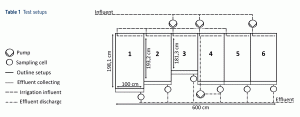Introduction
One of the causes of emissions to surface and ground water is the surface drainage of farms, consisting of grass silage effluents, leachates and fertilizers. The average pollution from a farm is equivalent to that of 20 to 30 households. Besides the discharge ban enacted in 2000, there are few useful measures available to farmers.
A possible solution is based on the new stable concept by Riemersma Construction & Design, the Greenroof design group (figure 1). But instead of using a traditional green roof, there is a wetland roof (figure 2), which has a purifying effect on the water used, in this case the surface runoff from farms.
Objective
Testing, developing and optimising the wetland roof as a purification technique for the treatment of surface drainage water from farms. The wetland roof is intended to reduce the emissions to surface water and groundwater and to enable the reuse of wastewater in sustainable agriculture.
Method
 Six test setups have been installed in the greenhouse at Van Hall Larenstein University of Applied Sciences in Leeuwarden. Each has different properties to assess the effects on purification efficacy (Table 1); for example, indigenous synthetic wastewater, with the same composition as surface runoff, will be made in the Water Application Centre. Regular tests are performed to determine Hydraulic Retention Time (HRT) and concentrations of suspended solids and dissolved substances (COD, nitrite, nitrate, N total and ammonium).
Six test setups have been installed in the greenhouse at Van Hall Larenstein University of Applied Sciences in Leeuwarden. Each has different properties to assess the effects on purification efficacy (Table 1); for example, indigenous synthetic wastewater, with the same composition as surface runoff, will be made in the Water Application Centre. Regular tests are performed to determine Hydraulic Retention Time (HRT) and concentrations of suspended solids and dissolved substances (COD, nitrite, nitrate, N total and ammonium).